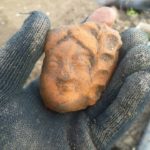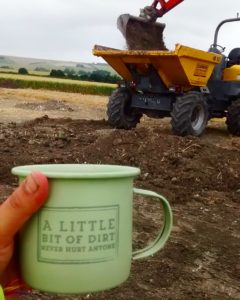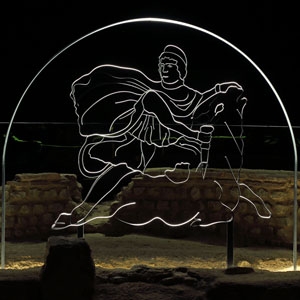
WHAT’S IT LIKE? Episode 7: Dr. David Walsh – A Specialist in Roman Religion and Mithraism.
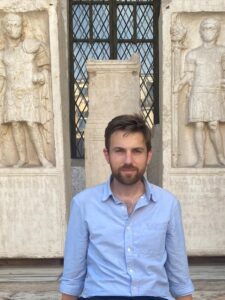 Name: Dr David Walsh
Name: Dr David Walsh
Area of Specialism: Roman History and Archaeology
Topics of Interest: Roman religion (especially the cult of Mithras), and the reception of Roman Britain by wider audiences (such as the works of Rudyard Kipling and Rosemary Sutcliff).
Job Title: Lecturer in Roman Archaeology
Job Responsibilities: I am a lecturer at Newcastle University, teaching modules on Roman Archaeology to students taking their undergraduate and post-graduate degrees. I also conduct research into my specialisms and try to maintain a steady stream of publications. When not in the office or lecture theatre, I supervise at the Birdoswald field school (currently exploring the settlement that developed around the Roman fort), and co-direct a project in Piedmont, Italy where we are surveying the Roman town of Industria.
Introduction
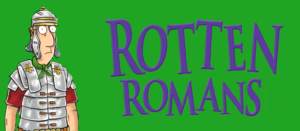 I spent a lot of my childhood visiting museums and heritage sites, as well as reading Horrible Histories, and I was part of the Scout Movement from 5-15. Archaeology provided the perfect way to combine these interests by exploring history while being outside. It wasn’t until I did my MA dissertation on ‘foreign cults’ in ancient port of Ostia that I became really interested in the cult of Mithras, which became the subject of my PhD. Although it’s not always been the most stable of careers, I’ve had a lot of great experiences as an archaeologist, getting to work abroad, meeting some fantastic people, and hopefully inspiring some future archaeologists when teaching.
I spent a lot of my childhood visiting museums and heritage sites, as well as reading Horrible Histories, and I was part of the Scout Movement from 5-15. Archaeology provided the perfect way to combine these interests by exploring history while being outside. It wasn’t until I did my MA dissertation on ‘foreign cults’ in ancient port of Ostia that I became really interested in the cult of Mithras, which became the subject of my PhD. Although it’s not always been the most stable of careers, I’ve had a lot of great experiences as an archaeologist, getting to work abroad, meeting some fantastic people, and hopefully inspiring some future archaeologists when teaching.
What is your daily life really like?
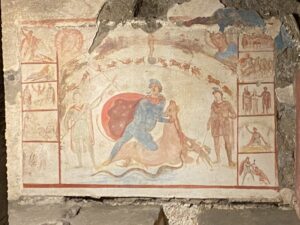 Daily life for me can vary on the time of year. During term, it’s a mixture of working in the office to prepare lectures, seminars, holding drop-in hours for students, marking, researching, and writing articles (usually with coffee on hand throughout). If I’m not in the office, then I’m probably teaching, have wandered off to the library, or am in a meeting. When the summer comes around, it’s 8.30am-4.30pm excavating on-site at Birdoswald for a month and then a couple of weeks walking up and down fields in northern Italy with survey equipment. I’d love to add a long list of hobbies I have outside of work hours, but these often consist of going to museums, and sites, and reading about archaeology/history. I do play quite a bit of FIFA, though.
Daily life for me can vary on the time of year. During term, it’s a mixture of working in the office to prepare lectures, seminars, holding drop-in hours for students, marking, researching, and writing articles (usually with coffee on hand throughout). If I’m not in the office, then I’m probably teaching, have wandered off to the library, or am in a meeting. When the summer comes around, it’s 8.30am-4.30pm excavating on-site at Birdoswald for a month and then a couple of weeks walking up and down fields in northern Italy with survey equipment. I’d love to add a long list of hobbies I have outside of work hours, but these often consist of going to museums, and sites, and reading about archaeology/history. I do play quite a bit of FIFA, though.
What is the best part of your job?
There are a few things I could point to. I do enjoy teaching prep, as it usually means I learn more about my subject, but my favourite activity is researching and writing my own articles. Fitting the evidence together, crafting your discussion, and adding another brick to the scholarly wall gives me a lot of satisfaction. When I’m out in the field, I still get a buzz when I find or am on hand to see a new discovery; I was one of the first people to see the Roman ring with its intaglio still in place found at Birdoswald this year, which was amazing. You also can’t beat the sense of accomplishment when one of your students tells you that they enjoyed your teaching and have been inspired by it. I’m very proud to have played some part in the successes my students have.
Why do you think your specialism is important?
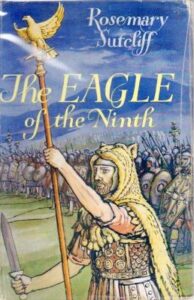 Archaeology is important for a variety of reasons.
Archaeology is important for a variety of reasons.
On the one hand, it’s been demonstrated that participation in excavations, membership in a society, and/or studying can have a positive impact on people’s mental health. Just look at the success of Operation Nightingale! Even just visiting a site can have a significant influence on people – as MoLA’s Oral History Project about the excavation of the London Mithraeum demonstrated. Many site visitors maintain an interest in archaeology and history throughout their lives.
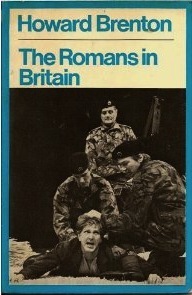
I also think people have a natural desire to contextualise themselves within history, and knowing where we come from helps them make sense of where we are and where we might be going. I study the reception of Roman Britain – how it’s portrayed in literature, film, TV etc. – because I was interested in how people relate to the past, particularly the Roman past. Societies often look to the past for stability, as if you can’t change what’s happened, but that’s not entirely true. The past isn’t static, it’s constantly reimagined.
This is partly due to new discoveries and interpretations, but also because the image people construct of the past often mirrors contemporary concerns. If you look at how people have presented Roman Britain in fiction, from Kipling to Sutcliff to Howard Breton’s The Romans in Britain, they are using it to explore contemporary issues and anxieties. Sutcliff is particularly interesting as she wrote over an extended period, and there are clear shifts in thinking about (the British) Empire. This consequently reflects in how she portrays life in Roman Britain.
Moreover, we have seen time and again how the Roman culture has been appropriated by various later rulers and empires to legitimise their own aspirations, often to the detriment of others and the past. Given the range of issues that we face in Britain today, it’s important for archaeologists to not only try to present an accurate picture of life in the ancient world, (regardless of whatever criticism that attracts), but also to ensure others are not using the past falsely to advance dangerous modern agendas.
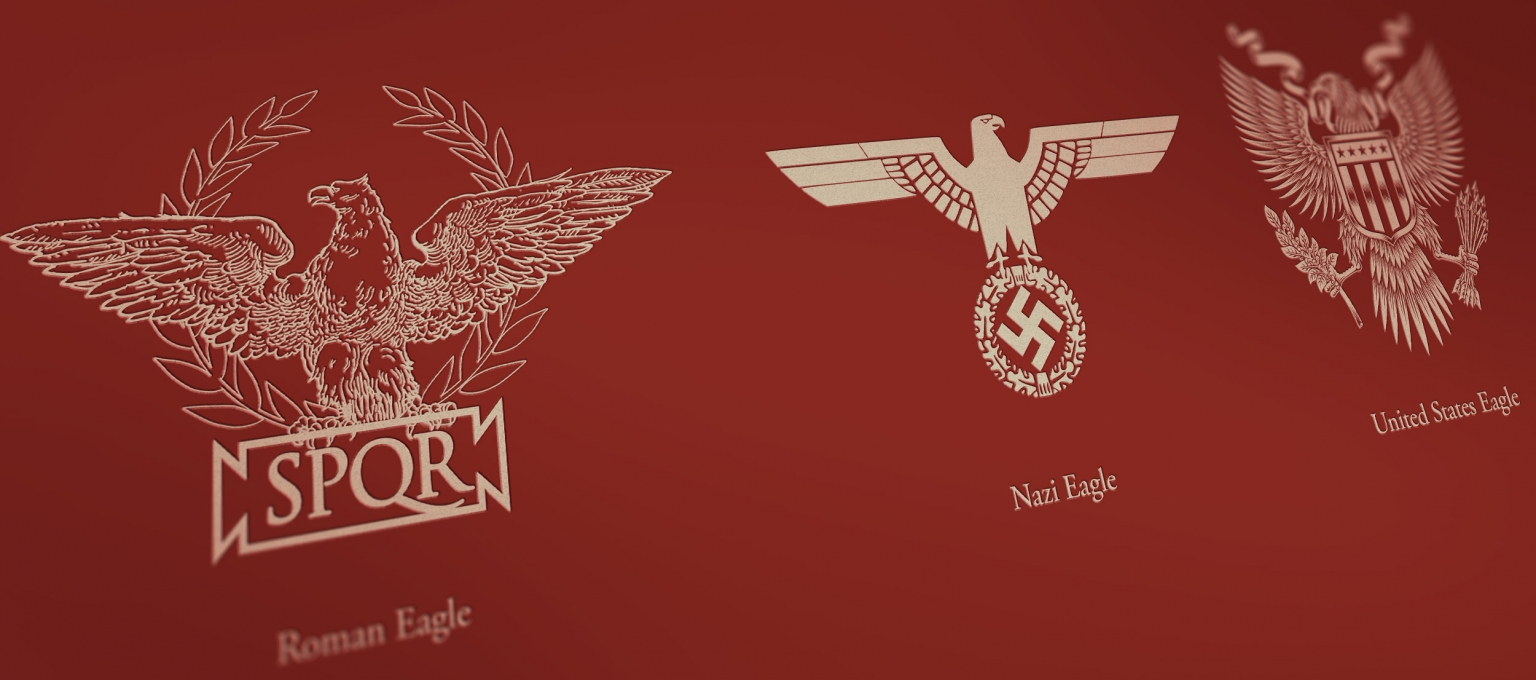
If you didn’t have the job you do, what else could you apply your skills to?

I guess the obvious alternative role would be as a teacher or something in heritage, but I think the ability to communicate effectively, both orally and via the written word, are important transferable skills that can help you in all manner of roles. For example, a former student of mine at Kent published an essay he did for me in the student-led journal The Posthole as he was looking to gain experience publishing his work and now works as a communications executive for Swindon County Council. Personally, it’s hard for me to think of what other careers I could pursue at this point. I did enjoy working at a garden centre selling Christmas trees, so there’s always that…
Did you always want to be what you are today?
I have always wanted to be an archaeologist, at least from around the age of 7-8 (I did have a brief period before that when my love of dinosaurs had me considering palaeontology), but I didn’t consider lecturing until I had finished my PhD. I’ve just taken it one step at a time and tried not to get too far ahead of myself. Each step along the way has been its own success and I’m conscious at some point, given the current landscape, that I might have to pivot in a different direction, but I’m still happy with those milestones I reached.
Where do you hope to be in 5 years time?
… employed! But the difficulties of the archaeological job market aside, hopefully, we’ll keep progressing with the survey work at Industria and eventually be able to move on to excavation. I’m hoping to obtain a grant to support a project on modern engagements with Roman temple sites in Britain, while I’ve also got a few more ideas regarding Rosemary Sutcliff’s work that I would like to develop. I am keen to get back to podcasting at some point, particularly as there is a wealth of people based in the Northeast who work on the Roman World, but it’s finding the time. I don’t have much else to say on Mithras at this point unless I went all out and wrote another book, but I think that might be something for a decade or so down the line rather than in the near future.
What 3 tips would you give to someone who wants to follow a similar path?

- Find mentors. If you’re studying at university, engage with your lecturers. Most colleagues I’ve known have genuinely wanted to see their students do well and are more than happy to advise, and even just a five-minute conversation might help you significantly. I didn’t start doing this until my third year of undergraduate, but it led to some wonderful opportunities that I wouldn’t have otherwise had, like excavating in Cyprus for a couple of months. If it’s field archaeology, get advice from colleagues and supervisors. It might sound weird, but you want to dig smart rather than hard, and experienced people can show you how to do that.
- Put your mental health first. I’ve been very lucky that I’ve never struggled too much with this, but I think most people would be lying (myself included) if they said the short-term contracts, the often bleak future that Humanities seems to face, and the physical demands of archaeology don’t take a toll. If it’s not enjoyable and is having a detrimental effect on you then it’s completely fine to take a break or even walk away entirely. It’s the system that’s broken, not you.
- Be authentic. While I’d encourage people to find mentors, make sure you don’t try too hard to emulate anyone else. Particularly in academia, it can be tempting to sound or write like someone you admire, but that might not be you. That’s not a bad thing, because the way you approach the subject and communicate might reach people that others haven’t and often this will impress people. I don’t think many of the people I admire would have hosted a podcast, but quite a few have been very complimentary about me doing it.
A Final Note
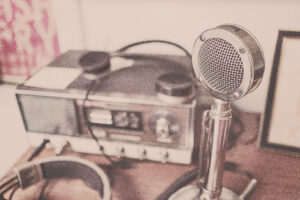
You can find the archive for the Coffee and Circuses Podcast here. My article on the cult of Mithras in the works of Rudyard Kipling is available here. I’m often lurking on Twitter although don’t post as much as I used to. In any case, do feel free to get in contact if any of my specialisms are of interest!
